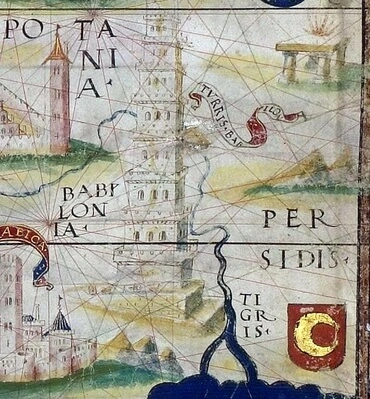9
너는 유다 사람의 목전에서 네 손으로 큰 돌들을 가져다가 다바네스 바로의 집 어귀의 벽돌 깔린 곳에 진흙으로 감추고

Babylon was an ancient city built on the Euphrates river in what is now southern Iraq. It once was the capital of a great empire which at one point conquered the land of Judah as mentioned in the second book of Kings and in Daniel. But the river changed its course and the city was abandoned long ago. Both the historic city in Mesopotamia and the parable city with its tower, mentioned in Genesis, represent the same thing, a worship that appears holy in externals, while the internals are profane. This representation expands to mean a church whose leaders use this kind of worship to gain dominion over others for their own gain and for the gain and power of the church. The city itself is the doctrinal structure that supports this kind of worship and dominion.
(参照: Apocalypse Explained 1029; Arcana Coelestia 1283, 1302, 1304, 1310, 1311)
1302. Verse 4 And they said, Come, let us build ourselves a city and a tower, and its head in heaven; and let us make a name for ourselves, lest perhaps we are scattered over the face 1 of the whole earth.
'And they said' means that this was done. 'Let us build ourselves a city and a tower' means that they fabricated a form of doctrine and of worship - 'a city' is doctrine, 'a tower' worship of self. 'And its head in heaven' means to the extent of their ruling over things in heaven. 'And let us make a name for ourselves' means that as a result they might gain a reputation for power. 'Lest perhaps we are scattered over the face 1 of the whole earth' means that otherwise they would not receive recognition.
脚注:
1. literally, the faces